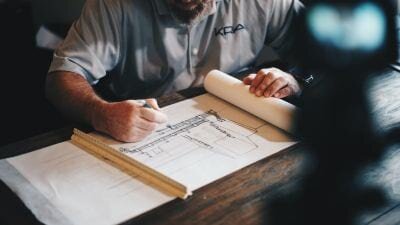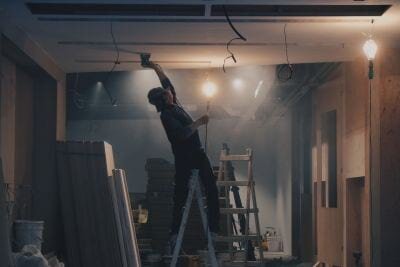Whether it is a totally new house or a minor extension it’s difficult to choose a reputable builder unless you happen to know one.
Yes there is a difference between developers and builders, when you are seeking to appoint someone to help you with your building project.
What are Residential Property Developers Exactly?
Residential property developers usually take the greatest risk in the creation or renovation of ‘real estate’ and therefore receive the greatest rewards. Typically, they:
Buy the land and finance the deal (possibly with leases).
Develop the building program and designs.
Work with many different professionals along each step of this process - including architects, city planners, engineers, surveyors, inspectors, contractors, leasing agents etc
Employ and manage the best builders, frequently their own or subcontractors, to build out the ‘structure’.
Determine the marketing of the property or properties.
Obtain the necessary public approval
Sell the property or properties (or rent them, depending on their financial plans).
Ultimately residential property developers create, imagine, control and orchestrate the process of development from beginning to end.
So How Is A Builder Different?
Builders are as important as residential property developers but are usually the people that do the physical work, without the financial burden faced by developers.
They build to the agreed consent of the land and/or home owner, to a standard known as “within building regulations and controls”.
The best way to find either a good builder or a good developer is through a personal recommendation, but there are other options should you not be able to get a recommendation.
The internet and Social Media are the most frequently used method such as Twitter or LinkedIn (asking in groups for LinkedIn may yield surprisingly useful results).
Whether you are planning a residential development or working with a builder, it's essential that you make as many checks as possible. You need to ask lots of questions to make sure you find a good builder who will not let you down.
How to Check a Builder's Credentials
There are several things you need to do before you employ a builder. Below are some of the most important:
Builder’s References
If you are considering using a builder ask them to take you to see work they have recently finished and to introduce you to the people who own the property. Don’t just accept a written reference or call – these can be easily faked.
Builder’s Qualifications
Look for the recognised qualifications in construction: NVQs and HNDs. The builder should have copies of certificates of their qualifications to show you.
Also check your builder can demonstrate awareness of health and safety issues – this is critical for any construction project a CSCS card, for example
Builder trade organisations
Organisations those builders may belong to include:
These bodies do not guarantee good work and they are funded by membership fees, but they can be an indication of a good builder's credentials.
‘Cowboys’ may, claim to be members of these organisations when they aren’t or after their membership has elapsed, so always check whether membership is up to date and do not let membership of these organisations be your sole criteria for appointing a builder.
Trader scheme memberships are worth noting - but they are only part of the picture.
Trades’ Insurance
Ask to see a copy of your builder's insurance certificate and check it will not expire during the time they are working on your project, allow some extra time in case your project overruns.
There are three things that you need:
public liability insurance in case someone gets hurt on your site
cover in case there is damage to the rest of your property, so that work may be re-done or they are insured to pay others, such as decorators, to remedy the damage
cover in case the builder goes bust or has an accident – this will enable you to pay someone else to finish the job.
If a builder does not offer all of the above insurance, you should take out cover yourself if you use them.
Engaging a Builder
Get Detailed Builders' Quotes
Some builders' quotes lack detailed information about the work and costs. You Should sit down with the builder and agree the following:
A fixed cost upfront or a daily rate of pay
The number of days that the job is likely to take
A contingency plan should there be any problems during the build including if the job takes longer than expected
The materials list should be gone through together, working out prices for each material – alternatively go to a builders’ merchant together and see what you can negotiate off the headline cost.
Builder Availability
You may be lucky and find a builder who is ready to start in less than two months, if they've had a cancellation. However, for really good builders you may wait as long as a year.
Beware of builders that are ready straight away – this could be a sign of a rogue trader. Most good builders tend to line up one or more jobs at a time, to ensure reliable workflow.
Written building work guarantees
Your builder should ideally guarantee his or her work for a period of time, and you should try to get this guarantee in writing.
Check whether the builder will come back and do any necessary remedial work if there's a problem and if you have the choice of getting someone else to do any remedial work as part of the guarantee.
Create a contract with your builder
Agree, by either a letter, a one-page document or formal contract, what work the builder is going do, the payment stages and what happens if there is a dispute.
If you do experience problems with your builder, it's important to give them the chance to put things right.
Paying Your Builder
Never pay for all building work upfront.
Draw up a schedule of payment for each stage of the work with the builder. Ideally, you should agree to release money only when each stage of the work is finished to the specification provided and to your satisfaction.
If you select the right builder a good building project can add value to your property, but it is also worth considering over developing. Sometimes it makes more sense to move then to stay in a house which you have outgrown.
For more information about buying your next home, please contact Premier Property Search on 01962 793100 or email enquiries@premier-propertysearch.co.uk
















